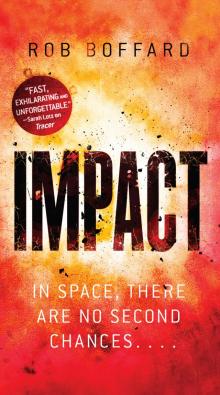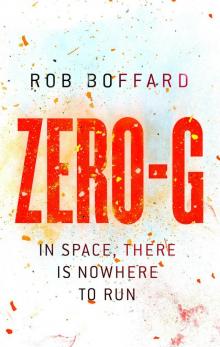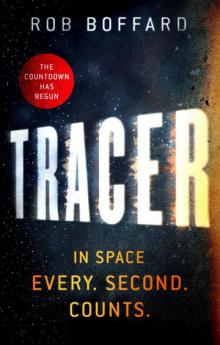- Home
- Rob Boffard
Zero-G Page 6
Zero-G Read online
Page 6
My lips are forming words, and I have to will myself to turn them into sounds, pushing them past my shredded throat. “And what if I kill you first?”
In response, he pulls at his scrubs, undoing the knot at his side and lifting them away from his bare chest. There’s a second box taped to his skin, nestling in thickets of wiry black hair. Two red wires run out of the box, burrowing into his skin, right over his heart. There are tiny, crusted rings of blood around the edges of the insertions.
“That wouldn’t be a good idea,” he says.
Very slowly, I get to my feet. Every movement sends a dull boom of pain echoing through me, radiating out from the stitches.
“Every second,” he says, “the devices inside you send out a signal. The device on my heart answers it, and it only works as long as my heart does. If your devices don’t receive that answering signal, they’ll detonate. Keeps things honest, wouldn’t you say?”
He turns back to the machine, bending over it.
“Look,” I say. “I don’t know who you are, or what you want. I don’t understand why you’re doing this.”
“Do you remember Amira Al-Hassan?” he says, not looking round.
Amira. My crew leader, my mentor, my friend. The head of our tracer crew, the Devil Dancers – the fastest package couriers on the station. The woman who tried to murder me on Janice Okwembu’s orders, who I killed in self-defence.
He looks at me, and taps his scrubs over his heart. “My name,” he says, “is Morgan Knox.”
I can just see the words stitched into the fabric, so faded they’re all but vanished. “Amira and I were in love,” he says. “And you took her away from me.”
I stare at him. “Amira didn’t have a…”
“You think she told you everything?” he says. His voice is nothing more than a hiss, the hatred in his eyes spreading out onto his face, twisting it into a rictus of anger. “You think she shared every part of her life with you?”
His fingers twitch, brushing the detonator button. I choose my words very carefully. “She never said anything to any of her crew. I swear.”
I pause. Could Amira have had a secret lover? It’s possible – she certainly kept a lot of things from us.
“She loved me,” Knox says after a moment, looking away. “I know she did. She delivered cargo to the hospital I was working at.”
Remorse has crept into his voice. “She was beautiful. I felt like we could talk for hours. Every time I saw her…”
I can fill in the blanks myself. This is not good. Not good at all.
“It took me months to find out what happened, but I did,” he says. “You killed her.”
I take a deep breath. Every word feels like a step on a tightrope, like a single wrong move could send me plummeting into the abyss. “She was trying to kill me, so I fought back,” I say. “It’s what she trained me to do.”
“I know,” he says. “It’s why I’m giving you a chance to make it through the next few days.”
“I don’t get it. You got to put these … these things inside me. What more do you want?”
“You?” he says. “You’re not what I want. You killed her, and you deserve everything that’s coming to you, but I’m after a bigger prize.”
For the first time, he smiles. “I want you to bring me the person who brainwashed my Amira. I want you to bring me Janice Okwembu.”
17
Riley
His words hang in the air between us.
“No way,” I say.
“You’re not exactly in a position to refuse.”
“No way, because it’s impossible. She’s in max security. There’s no way to get her out.”
I can already hear Royo’s words in my mind: Everybody’s entitled to a fair trial by an elected council. That includes her.
“You’ll just have to figure it out,” he says. He turns, his leg making the motion awkward and jerky, and limps over to the other side of the room, yanking open a drawer and rummaging through it. “After all, if you can travel all the way through the Core and take out Oren Darnell, a prison should be no problem.”
I screw my eyes shut, hoping that when I open them it’ll all go away. It doesn’t.
“If you feel you need more motivation,” he says, “I could always perform the same procedure on one of your friends. Except in their case, I’d implant the charges directly into their brains. I haven’t done neurosurgery in a while, however, so I may not remember which parts are safe to cut into.”
The thought of Carver, of Kevin, of Prakesh being subjected to this monster gets my legs trembling again, and I have to consciously force them to stop.
“I need time,” I say.
“You’ve got forty-eight hours,” he says over his shoulder.
“It’s not enough.”
“That’s your problem,” he says conversationally, as he turns and walks towards me. “You should be grateful I’m giving you even that.”
He hands me a small tube of cream, the surface cold to the touch.
“Of course, as your doctor,” he says, “I advise you to get plenty of rest and keep yourself hydrated. You need to be performing at full capacity.”
He gestures to the cream. “Apply that three times a day, and keep taking your painkillers. I like to make sure my patients are comfortable after an operation.”
It’s all I can do not to lash out at him. I have to contain my anger, my frustration, locking them away behind clenched teeth. “I run, OK?” I say. “I run, and roll, and knock into things. If I hit my knee too hard—”
“And are there many situations where you take a blow to the back of your knee?”
“You think I can run with these things inside me?”
“Of course. I designed them that way. Or were you not listening when I explained about the popliteal fossae?”
He points. “Your clothes are under the table.”
As if in a trance, I pull my jumpsuit out, then sit down again to put it on. Bending my knees all the way hurts, an electric sting shooting up through my legs.
Knox tilts his head to one side, looking at me as I slip my arms into the sleeves. “Tell me – do you miss being a tracer?” he says. “Do you miss not being able to run where you like?”
When I don’t respond, he says, “You couldn’t keep the Devil Dancers together, could you? After Amira died. You didn’t have her spirit. You had to go begging to the stompers.”
“It wasn’t like that. They—”
I lower my head. I’m not giving him anything more. He has way too much already.
“Here,” he says. “I’ve charged it for you. You shouldn’t have to worry about running out of power.”
I turn back to look at him. He’s holding out my SPOCS unit. It’s strange that in the time I’ve been awake I haven’t noticed its absence. I guess I still haven’t got used to it.
“I need the wristband,” I say. Knox hands it to me, and I snap it on.
“I’ll turn that back on for you after you leave,” he says. “I made a few changes to the basic design. I can listen into your conversations whenever I feel like it, and I will, so please keep it in your ear at all times. I’ve also added a small external microphone, so I’ll know what’s happening around you. I like to know that our little arrangement is just between us.”
I stare at him. “How did you…”
He ignores me. “Don’t take it out. Not ever. And don’t think you can switch channels to get rid of me. Whatever you hear, I hear.”
“And if I have to talk to you?”
“Just say my name. If I hear you and respond, it’ll lock out anybody else on the channel. They’ll think it’s a glitch, and we’ll be able to talk.”
He gestures to the door. “Get going.”
I don’t need an invitation. But as I walk towards the door, each step sending prickles of pain shooting through my legs, I get an idea.
“You’re bluffing,” I say, turning back to face him.
“Am I?”
/>
“I think it’ll take a lot for you to hit that button. You want Okwembu, and so you need me.”
He nods, as if he expected me to say this. “I need you functional, that’s true. But go ahead. See what happens.”
His smile is one of the most terrifying things I’ve ever seen.
“You won’t do it,” I say.
“But what else will I do?” he says. “You think I’ve told you everything? Test me, and you’ll suffer in ways you can’t even imagine.”
With that, he closes the door in my face.
The sound of the door shutting fades away. I look around me: the walls in the corridor outside Knox’s surgery are caked over with rust. A beam of light cuts across the darkness ahead of me, picking out dust motes hanging in the air.
I close my eyes, listening hard. I can just make out the cries of the silkworm merchant, far in the distance.
With my heart in my mouth, I go from a walk, to a jog, to a sprint. I expect to feel the devices Knox put inside me – in my head, I picture them grinding up against the bone, making themselves felt with every step. But he was right: they don’t stop me moving. Not even a little. There’s stiffness, and the pain is still there, only partially dulled by the drugs, but that’s all. It’s only when I hit the corridor with the red graffiti that I stop, one hand on the wall, nausea doubling me over.
This isn’t happening. It can’t be. Knox is lying. There’s nothing inside you.
But I only have to focus on my knees to realise that that isn’t true. It’s not just the stiffness: there’s a pressure, a feeling that wasn’t there before.
I stand up straight, breathing deeply, taking my hand off the wall. The dust sticks to my fingertips, and the edge of my palm.
Write it down.
How could I not have thought of that? I can’t talk about what’s happened to me out loud, not with him listening in over SPOCS, but I can write it down – hell, I could use the dust on the wall if I had to. I could find Carver, or Royo, and tell them. After all, Knox can’t see what I’m doing, and if I keep talking while I do it …
Then I remember what he said. That if he found out that I told anyone he’d blow the bombs. And then go to work on whoever I told.
Can I risk that? Can I put other people in danger?
Not yet. If it comes down to it, if time starts running out, then I’ll tell someone. But for now, this is on me to handle.
I make myself focus. Okwembu. Just the thought of her – of what she did – causes a little bubble of hatred to rise up through me. Sometimes I go days without thinking about her, but she keeps coming back, like a cut on the roof of my mouth that I can’t stop touching with the tip of my tongue.
I clench my hand into a fist. It’s still on the wall, and my fingernails scrape across the metal. I pull it away, tiny jolts of pain shooting up my fingers, and jog away down the corridor, thinking about where I have to go next, and hating myself for it.
It doesn’t take me long before I reach the max security brig. I have to work hard to convince the guards outside that I need to get in – there are eight of them, wearing full body armour. Can’t say I blame them. There have been plenty of pissed-off people trying to get in, to take revenge for what the occupant put Outer Earth through.
But, for once, my reputation helps. The guards know me, they know what I’ve done, and they know my history with the person inside. It helps that I can fabricate a plausible reason to be there: I make out like it’s to do with the Recycler Plant, that we need to make absolutely sure that it had nothing to do with her.
The inner door opens up into a narrow corridor. There are four cells in this particular brig, two on either side, spaced at wide intervals. The lights are harsh, not even letting a shadow escape, and the frosty air bites through my clothes. It’s easy to find the cell I need. It’s the only one that’s occupied.
I reach the cell, and see her lying on the bed, her arms under her head. I rap hard on the transparent plastic covering the front.
Janice Okwembu rises up on her elbows, staring at me.
18
Riley
“Ms Hale,” Okwembu says, moving to a sitting position on the bed.
The last time I saw her was in the control room in Apex, right after I had to kill my father. She looks, like she always does, as if she’s in complete control. As if she was in a council meeting, or broadcasting a message to the station, rather than locked away in a cell. She was a computer programmer before she became a councillor, and it’s easy to imagine her parsing real life like she did computer code, cool and logical and unhurried.
“I hear they’re close to reforming the council,” she says. “I assume that means I’ll be on trial soon. I’d be lying if I said I was looking forward to it, but perhaps I can show people what I was trying to do. Tell them that I was acting in their best interests.”
I barely listen to her. I’m scanning her cell, looking for any weak spots. The plastic is sealed tight into the walls and ceiling – no cutting through. The door release mechanisms are by the entrance, but there’s no way I could spring them, and get her out, before the stompers outside gun me down.
She sees where I’m looking. “I assure you, I’m most secure in here. Just as well.”
I don’t look at her. “Shut up.”
“Didn’t I give you a choice? Didn’t I acknowledge your sacrifice? Isn’t that worth more than hatred from you?”
“It’s worth nothing to me,” I say, instantly furious at myself for letting her draw me in. The scar on my left wrist starts itching, and I have to force myself not to scratch it. Hell of a choice. Cut your wrists and be remembered as a hero, or take a bullet and go down in history as a traitor. Okwembu’s twisted way of making things right.
Too bad I’d turned on the station’s main comms and unlocked the entrance to Apex. Everybody heard what she’d done, and they came for her.
Just in time. I’d almost bled out.
She folds her arms. “I can only tell you how sorry I am so many times before it becomes pointless. If it were up to me, you would never even have been involved. All I wanted was to bring peace to Outer Earth.”
“With you in complete control.”
She laughs. “Do you know how the moon was formed, Ms Hale?”
I don’t respond. There’s got to be a weak link, something, anything I can use to get her out of there.
“A long time ago,” she says, “another planet collided with the Earth. It shattered our newly formed crust. It turned every part of the Earth’s surface into magma. An ocean of lava. And it created an enormous body of material orbiting our planet – rock, dust, debris.”
I want to tell her to stop. I can’t quite manage it. Okwembu seems to sense this, and takes a step towards the plastic barrier.
“Over time, that debris came together as one object – a ball of rock known as the moon, orbiting Earth and changing the surface. The oceans, when they formed, had tides. The impact from that other planet knocked our own a little off its axis, angling it towards the sun. From chaos, Ms Hale, comes life. From adversity, comes strength.”
“That’s a great story. I’ll tell it to the people you nearly wiped out.”
“I was only—”
“You can talk as much as you like. You’re still in there, and I’m out here. All you have to look forward to is a trial, and the firing squad.”
Okwembu says nothing. My shoulders are too tense, and it takes me a moment to realise that I’ve got closer to the plastic. I’m almost right up against it.
She raises her chin. “That’s why you came to visit me.”
“What?”
“You want me to be evil. You want me to be insane, because it would absolve you. It would mean that killing Amira and Oren Darnell and your own father wasn’t your fault.”
Okwembu puts a hand on the plastic. “Do you dream, Ms Hale? I do. And I’m sure my dreams are easier than yours.”
My right hand twitches. Before I can stop myself, I sl
am a closed fist on the plastic barrier. The bang rockets around the cell block. Okwembu takes a step back, startled, a flash of fear appearing in her eyes. It vanishes an instant later, replaced by that cold stare.
My hand is humming with pain. I shake it out, not looking away from her, only becoming aware of the guards when one of them puts a firm hand on my shoulder.
They yank me away from the cell, pulling me by the arm towards the entrance. Then they shove me outside, and close the barred door behind me.
19
Knox
The picture of Amira Al-Hassan is old, taken when she was still a teenager. She hadn’t yet developed the high cheekbones, the dark eyes. But it’s unquestionably her. There’s a warning in her face – she’s staring back at the camera as if daring it to make a move.
It’s the only file photo they had, and it took Knox a long time to track it down. He has it maximised on his tab screen, and his thumb traces the delicate curve of her jawline. What he wouldn’t give to have a more recent picture of her. What he wouldn’t give to have seen her one last time.
He puts the tab screen down, then pushes himself up from the hard chair in the corner of his surgery. He knew this would be the worst part of the entire operation. The waiting. Hale is in play now – sufficiently motivated, he hopes – but even she will take a few hours to come up with a plan.
His hand finds the tab screen again. Amira’s photo has shrunk back down, and for the hundredth time he reads her file information, lined up alongside the photo. Born in Apex. Orphaned at an early age. Recognised by the council for bravery and personal sacrifice during the lower sector riots. Declined council post. Last known affiliation: Devil Dancers tracer crew, Apogee.
There’s nothing else in the file. As he always does, Knox feels a surge of anger. The file doesn’t record how she died. It doesn’t record how she was murdered.
He should have said something to her when he had the chance. He remembers when he first saw her – over time, it feels as if the memory has grown sharper, new details popping up. The way she strode through the hospital doors, the way her eyes picked him out of the crowd instantly – and never left him. He remembers the impossible curves of her body, the shrug of her shoulders as she shucked her pack, the touch of her fingers when she passed him the cargo. He couldn’t say anything, could do nothing but nod a mute thanks.

 Adrift
Adrift Impact
Impact Zero-G
Zero-G Tracer
Tracer